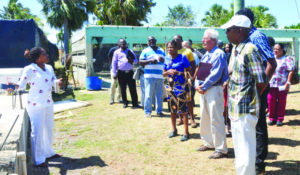
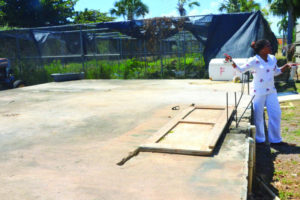
The Aquaponics farming project under the auspices of the Department of Natural Resources, has been launched.
The ceremony took place at the Agricultural Grounds in The Valley on Wednesday 15th March, 2023.
The initiative seeks to develop food security that would benefit the people of Anguilla, who would be expected to create aquaponic systems in their own backyards.
The aquaponic method of food generation consists of two sectors – fish farming and fruit/vegetable or agricultural farming.
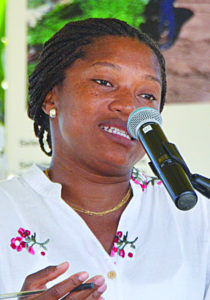
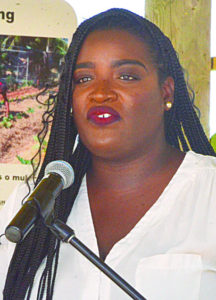
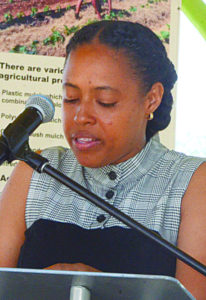
Director of Fisheries, Ms. Kafi Gumbs, is a lead in the project. She spoke about the fishing aspect of the initiative during the launch on Wednesday morning.
“I have been getting questions on the fishing part of the system,” she said. “One of the prime questions is: ‘We have so much water around us, so why are we going to farm for fish?’ But fishing via the aquaponics system is basically a supplement to regular fishing. We will be therefore doing lots of educational programmes to inform people about this food production system.”
 “This aquaponics project addresses the need for Anguilla to transform its fisheries and agriculture sector, reduce dependence on imports, strengthen food safety and security, support healthier life styles and manage well balanced diets,” she explained. “The beneficiaries of this project will be able to produce high quality fish and produce to feed themselves and possibly create new revenue streams.”
“This aquaponics project addresses the need for Anguilla to transform its fisheries and agriculture sector, reduce dependence on imports, strengthen food safety and security, support healthier life styles and manage well balanced diets,” she explained. “The beneficiaries of this project will be able to produce high quality fish and produce to feed themselves and possibly create new revenue streams.”
Some of the objectives of this initiative include increasing public awareness about the importance of alternative sustainable food production; establishing a small aquaponics demonstration facility on grounds of the Agriculture Department; and increasing national capacity on low-impact, low-put food production using backyard aquaponic systems.
Ms. Isabel Rosario is the Project Lead for Agriculture. She also spoke of the benefits of the aquaponics initiative.
“Green houses, hydroponics, aquaponics, vertical farming and aquaculture, to name a few, are all innovative systems that can be used to aid in sustainable food production whether it is on a commercial or backyard scale,” she said. “These systems allow food producers to cultivate in a sustainable manner, as they are allowed to control the growing environment, recycle water, use solar energy and reduce the use of pesticides, thus providing healthier and safer foods.”
“Over the past few months, the agriculture unit has been involved in an indoor hydroponics system pilot project called the Flex Farm. The Flex Farm addresses some climate related challenges that can affect food production and security. It also helps to address water concerns and issues of irrigation,” she said.
The Flex Farm system re-circulates the water, and it is housed indoors in a room which does not utilize much space. The light and temperature in the room is monitored and controlled, and there is no need for any form of pesticides. The system features a high level of sustainability, food safety and successful yield.
The Honorable Minister of Sustainability, Innovation & the Environment, Mrs. Quincia Gumbs-Marie, who is responsible for natural resources, spoke on the need for making healthy foods more accessible, as she highlighted three factors that are characteristic of the aquaponics project.
“This project embodies the three pillars of this ministry” she noted: “First, there is sustainable development; secondly, innovation; and thirdly, environmental protection.”
“There can be no sustainable development without addressing the issue of food security,” she said. “This is one of the biggest challenges facing Anguilla and the rest of the region and is a top priority of this administration. If we are to become more resilient and reduce the impact of external shocks brought about by natural disasters, pandemics, supply chain shortages and the like, we must significantly increase our capacity to feed ourselves. Food security is vital.”
“Similarly, if we are to successfully battle the non-communicable diseases that are overwhelming the health systems in our region – and taking the lives of so many of our people – then we must not only promote healthy eating, but make healthy foods more accessible,” the National Resources Minister emphasized.
Health Protection Unit Nutritionist, Ms. Robertha Campbell, said there are several benefits that can be derived from eating the healthy foods that come from the aquaponics system.
Making reference to a quote from Hippocrates, she said: ‘“Let your food be your medicine, and let your medicine be your food.’ This simple ‘prescription’ highlights the benefits of foods that are nourishing to the body, the mind and the soul.”
“Sadly, we have veered from this prescription over the years,” she said, “and this is well documented in our STEP Health Survey that was undertaken in 2016, where it was indicated that we as a nation are not consuming the right amounts of fruits and vegetables. Thus, we are seeing an increase in chronic diseases such as diabetes, high blood pressure, cancer and heart disease.”
“As we face these challenges, though, this aquaponics project gives us the opportunity to increase our consumption of fruits and vegetables and can enable us to eat healthier foods that can be grown in our own backyards,” she noted. “Foods like legumes which include peas, beans and nuts are essential to our nutrition. The cultivation of ground provisions, and the consumption of healthy fish can also result from taking advantage of food produced by this aquaponics system.”
Others speaking at the launch included Permanent Secretary Economic Development, Mrs. Chanelle Petty -Barrett and the Chief Natural Resources Officer, Ms. Melissa Meade.
A young student of the Albena Lake-Hodge Comprehensive School, Mr. Garcia Lewis, shared his vision of participating in and partnering with the aquaponics project.
The aquaponics project is part of the Resilience, Sustainable Energy and Marine Biodiversity (RESEMBID) programme for Anguilla, and is funded by the European Union in the amount of Euros 292,000.







